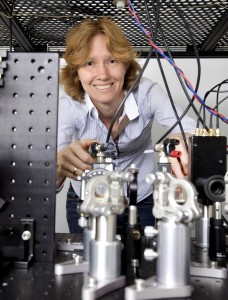ERC Grants for Nynke Dekker and Ibo van de Poel
The European Research Council has awarded an ERC Advanced Grant of 2,5 million euros to two professors from Delft University of Technology. Nynke Dekker, professor of Biological Physics, will map the replication of chromatin in yeast using single-molecule techniques. Ibo van de Poel, professor of Ethics and Technology, will develop a philosophical theory of value change.
A chromatin replication timeline
Professor Nynke Dekker
DNA replication is essential to cellular function. During a lifetime each one of us synthesises no less than a light-year's length of DNA. This mechanism is extremely robust and relatively few mistakes are made during copying.
In eukaryotes, DNA is packed into chromatin – an assembly of DNA and proteins found in the cell nucleus that resembles a string of beads when seen under a microscope. The individual beads, called nucleosomes, are places where the DNA strand has wrapped itself around these proteins, creating compact packets of genetic material that regulate gene expression, among other things. They determine which genes become active and in what way and are thus responsible for ensuring whether a cell develops into a nerve cell or a muscle cell, for example. Epigenetics, the influence of external factors, also plays a role in this.
Just like DNA, the chromatin structure, including all the active and inactive genes, must be copied accurately. A good understanding of the interaction between DNA replication and chromatin replication is important because it can give insight into such things as epigenetic inheritance and the development of cancer. In this project, Nynke Dekker will be mapping the replication of chromatin in yeast using so-called single-molecule techniques. These kinds of techniques enable her to closely examine the working of individual molecules. Dekker’s goal is to create a mechanistic timeline of the steps in which chromatin is replicated.

Research design for changing values
Prof. dr Ibo van de Poel
In the coming five years, he and his research team will develop a philosophical theory of value change that can be used to improve the ability of systems such as gas infrastructure, blockchains, energy grids and self-driving cars to adapt to changing values.
The project builds on existing work on Value Sensitive Design in which moral values such as safety, sustainability, privacy, justice and democracy are incorporated into technological design. However, there is still an important blind spot because current theories and approaches assume that values are static while in reality values often change after a technology has been designed. As a consequence of this blind spot, a mismatch may occur between the values that were embodied in the past in the sociotechnical systems surrounding us, and the values we find important today. For example, many of our current energy and transportation systems do not yet sufficiently meet the value of sustainability. Although this is now generally recognized, it is also clear that we cannot change these systems overnight as these systems have large technological and institutional momentum and so have the values embedded in them.
The research programme will develop a philosophical theory of value change. It proposes a dynamic rather than a static account of values, it develops insights in the dynamics of value change, and extends analyses about the embedding of values in technology to sociotechnical systems. This will all contribute to the development of design strategies to design sociotechnical systems that can better adapt to value change. The theory will be applied to empirical studies about value change in energy systems and robot systems.
